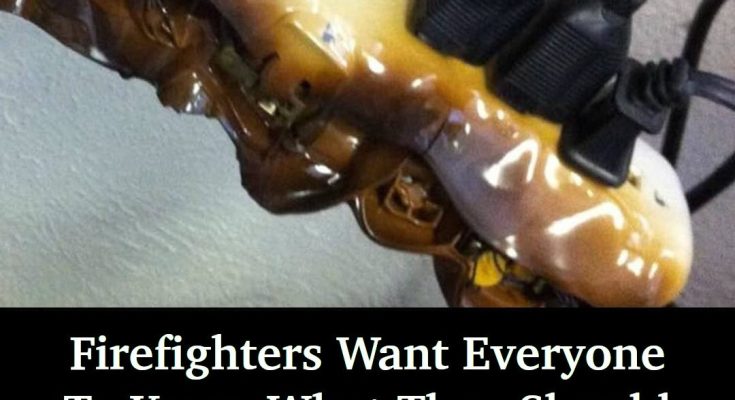Firefighters Want Everyone To Know What They Should Never Plug Into A Power Strip
With the onset of the cold winter months, individuals throughout the northern hemisphere are activating their heating systems and retrieving space heaters to maintain warmth. Nevertheless, firefighters emphasize a vital safety guideline for anyone utilizing a space heater: it is imperative never to connect it to a power strip.
The Umatilla County Fire District 1 in Hermiston, Oregon, has released an urgent message on Facebook, alerting the community to the risks associated with connecting a space heater to a power strip. They emphasized, “It is imperative that heaters are not plugged into power strips.” The district explained that power strips are not engineered to accommodate the substantial current required by space heaters, which can lead to overheating or potentially ignite a fire as a result of the increased energy demand.

This alert rapidly gained widespread attention, as numerous individuals were oblivious to the dangers associated with this practice. The Toledo Fire Department in Ohio issued a comparable warning following a house fire that resulted from a space heater being connected to a power strip. The extreme heat generated by the heater ignited the couch, leading to the entire residence being consumed by flames.
Space heaters have the potential to attain temperatures as high as 600 degrees Fahrenheit, which poses a significant fire hazard if not utilized correctly. According to the Consumer Product Safety Commission, approximately 1,200 fires annually are attributed to portable electric space heaters, frequently resulting from negligent handling.
The firefighters in Oregon highlighted that space heaters are not intrinsically hazardous; rather, the potential danger arises from their usage by individuals. “The key issue is proper utilization. Even the most reliable equipment can malfunction if not operated correctly. No single manufacturer bears responsibility; the focus is on the end user’s capacity to employ the product safely.”

Credit: Shutterstock
To put it differently, space heaters are entirely safe when connected directly to a wall outlet. However, the significant energy requirements of these heating devices can easily exceed the capacity of a power strip, leading to overheating and the potential for a catastrophic fire. Firefighters strongly advise against taking such risks.
To ensure the safety of your home and family during the winter season, it is essential to adhere to several key electrical fire prevention guidelines.
1. Keep All Heat-Producing Appliances Unplugged When Not in Use

Credit: Shutterstock
This encompasses items such as hair styling devices, electric kettles, and, notably, space heaters. Any appliance that produces heat upon activation carries the risk of overheating and potentially causing a fire if it remains plugged in.
2. Use Extension Cords for Temporary Use Only

Credit: Shutterstock
Extension cords are not intended to serve as a long-term solution. Their design is for temporary and infrequent use. If you frequently require extra outlets, it is advisable to consult an electrician to install more permanent electrical wiring in your residence.
3. Keep the Third Prong

Credit: Shutterstock
The third prong of a power cord plays a crucial role in ensuring safety by providing protection against power surges and electrical failures. It is advisable to refrain from using two-pronged outlets and to contemplate upgrading your home’s electrical system if it is equipped with outdated wiring.
4. Update Your Electrical System

Credit: Shutterstock
Homes that are older tend to have a higher susceptibility to electrical fires, primarily due to their outdated wiring and fuse boxes. It is advisable to have a qualified electrician assess your home’s electrical system and implement any necessary upgrades to mitigate the risk of fire.
5. Don’t Use Damaged Power Cords

Credit: Shutterstock
Should a power cord exhibit fraying, a broken prong, or any form of damage, it is imperative that it not be utilized. Compromised cords have a high potential to overheat, which may lead to a fire hazard.
6. Follow Appliance Directions

Credit: Shutterstock
It is essential for manufacturers to incorporate critical safety information within their product manuals; therefore, it is advisable to thoroughly read and adhere to all instructions. Doing so will ensure the proper use of appliances and mitigate the risk of potential fire hazards.
7. Don’t Ignore Trouble Signs

Credit: Shutterstock
Be on the lookout for any warning signs that an appliance or electrical outlet may be malfunctioning, such as:
- Burn marks or discoloration around a socket or light fixture
- The appliance, power cord, or outlet feeling hot to the touch
- Burning smells while the appliance is in use
- Sparks or shocks when plugging in an appliance
- Frequently tripping breakers or blowing fuses
Make sure you have working smoke detectors in every room, so you’ll be alerted right away if something goes wrong.
With the arrival of winter’s chill, it is essential for all individuals utilizing space heaters to implement appropriate safety measures. Connecting these powerful heating units to a power strip poses a significant risk, potentially resulting in severe electrical fires. By adhering to the recommendations of fire safety experts and observing fundamental electrical safety protocols, you can maintain warmth and comfort throughout the season while safeguarding your home and loved ones. Prioritize safety and enjoy a warm winter!




Thank you for sharing such valuable information!